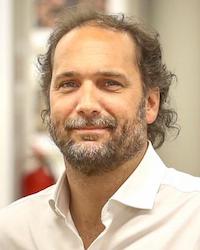RED/ACCION: both a formal innovation lab and daily experimentation in the newsroom
It’s important to have the space, the resources and the time to experiment and learn on a daily basis in the newsroom. “We don’t want the Maker Lab to be the only place where experimentation and learning take place”, says Chani Guyot.
Having spent 20 years as a journalist and editor-in-chief at La Nacion, Chani Guyot decided he would like to do something else in the next 20 years of his career. In April 2018 he launched RED/ACCION, after having collected 1,5 million dollars in initial funding in only two months.
The digital pure player combines a 12 people newsroom that’s exploring different ways to report mobile stories with a formal innovation lab:
“We don’t want the Maker Lab to be the only place where experimentation and learning take place. We’re very serious about having the space, the resources and the time to experiment and learn on a daily basis in our newsroom, even if we don’t put the name Lab on it.”
Maker Lab with students
Chani teamed up with Juan Mascardi, one of the best journalists and teachers in Argentina, to develop a model of the Maker Lab that is very focused on students:
“Because we want young men and women in their early twenties to have the tools, the space, the support and the training to really experiment.”
Their first project will be around Inclusive Cities, in Rosario, the third city of Argentina, well known for its education and cultural life. During a three-month program, students get hands-on training, tools, and editorial support to report on the topic of ‘inclusive cities’, and RED/ACCION publishes their stories:
“We focus on how to tell local stories with your phone and for your phone. So that’s the scope of the lab, mainly, with the use of video, data, and transmedia with some tools. It’s a very small scope because we want to move forward quickly and that’s the way to do that.”
As they only just started selecting students from the 4 journalism schools in Rosario, it’s too soon to say anything in terms of results. But after this pilot in Argentina’s third largest city, the idea is to roll out the format to other places in the country, around the topics that are relevant to each city.
Newsroom experiments
The Lab is part of a digital pure player that Chani launched only last April. He stresses that experimentation and learning shouldn’t just happen in the lab. On a daily basis, the newsroom is experimenting with new formats and new ways of working, especially around conversational platforms:
“We think that conversational platforms are a big deal and will be a bigger deal in the future. In Argentina we have 1,2 cell phones per person and one of the highest rates of active Whatsapp accounts. So the day Whatsapp opens its API we want to be ready.”
As part of the experimentation with conversational platforms, RED/ACCION published a number of interviews that were made on Whatsapp and published as a collection of screenshots:
“When you read that on your phone you feel like you’re sneaking into a private conversation. Because that’s the usual usage of Whatsapp, and the tone and style are preserved.”

To take this a step further, they tried to use Al Jazeera’s open Interview API SJ, but the user experience was a little clumsy. For another story about bees, a bee would die when you touched it on your screen. This element was eventually taken out, because it didn’t suit the spirit of the story. But those ‘mistakes’ are part of the process, according to Chani:
“The interesting thing I think is that we published, saying to our readers: we are experimenting – we want to learn – what do you think? And we are receiving a lot of feedback.”
Training your muscles
“The most interesting things we learn doing Instagram stories. We do quizzes, and almost everybody fails. We’re breaking open common sense by showing the difference between what you think the story is and what it actually is.”
Some of these projects don’t lead to any direct results –even though most of them increase audience engagement with the project–, you’re still training muscles that you can then use for projects that you don’t know now might come along in 6 months or so, says Chani:
“Like when you’re doing sports and suddenly discover you hurt in places you didn’t even know you had muscles.”
Fast, faster, fast
Going from a large legacy media company to starting an online outlet from scratch, Chani has been mostly surprised by the speed at which things can move from decision to execution. Recently, for example, when a friend called him about publishing a new podcast series:
“She called me in the morning to ask if we wanted to partner on it. 24 hours later we approved the idea, got the technical requirements in place and published the first story.”
There’s no question for Chani that La Nacion is an exquisite company, but the beauty of being small is that the reward doesn’t have to be enormous:
“I was leading a newsroom of 300 people and even though we had more or less unlimited resources, you need to know the size of the impact when you move forward with these kinds of projects. In our case, as we are new and small, the risk is lower.”
Nurturing small ideas
Being small gives you advantages in terms of going faster and deeper. In a big structure small ideas are usually dropped too fast unless they prove that they have the potential of becoming big ideas. It’s easier to breed small ideas turning into big ideas in a small structure than in a big one says Chani:
“I love this idea that a big idea, a very big idea, it’s really just a small idea that finds someone courageous to protect it through the breeding phases. And of course, once they become big ideas, they are adopted by big media. That’s beautiful.”
CONTACT POINT

Chani Guyot, founder, RED/ACCION
Web: https://redaccion.com.ar/lab-de-redaccion/
Twitter: @carlosguyot
